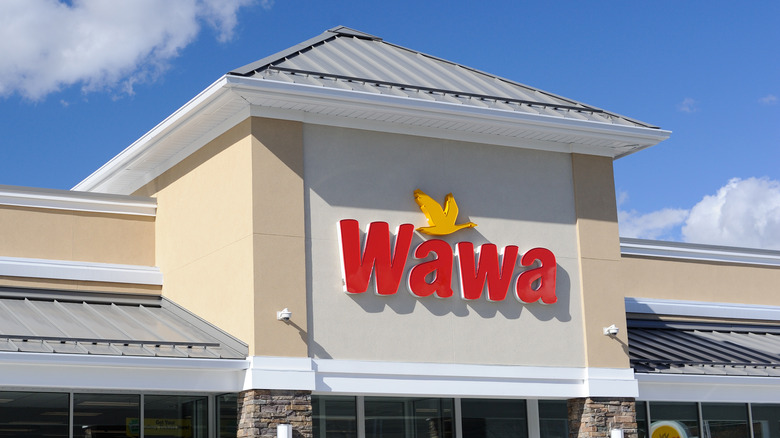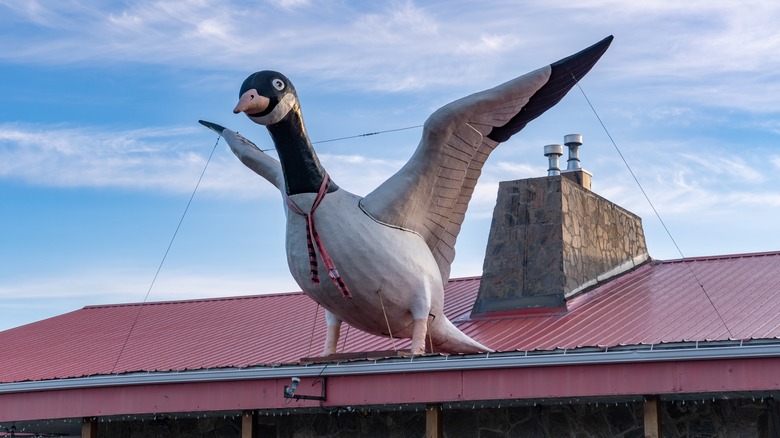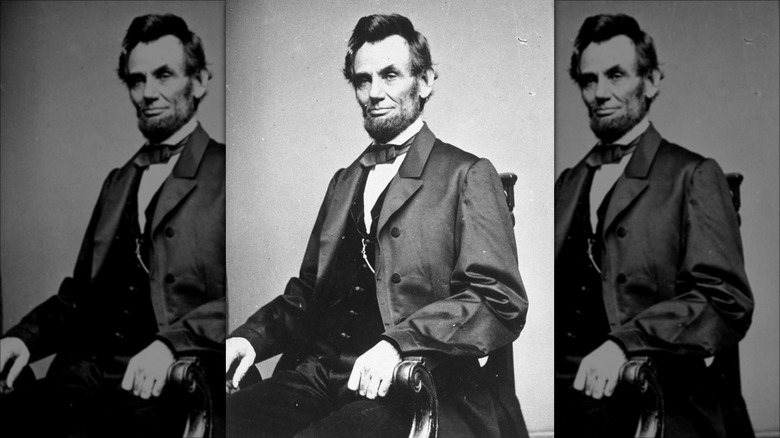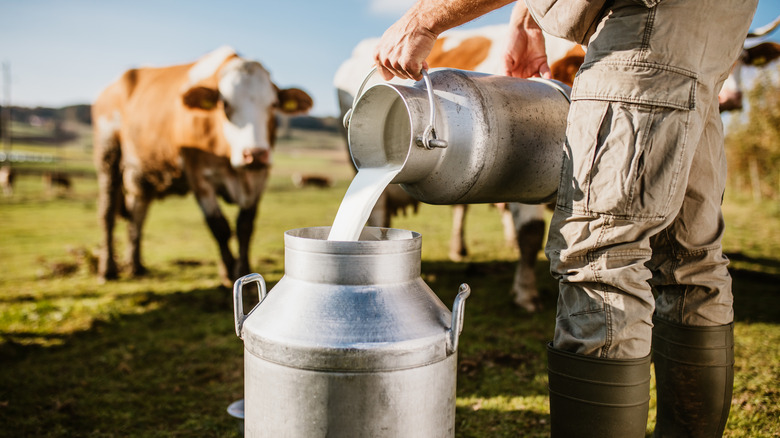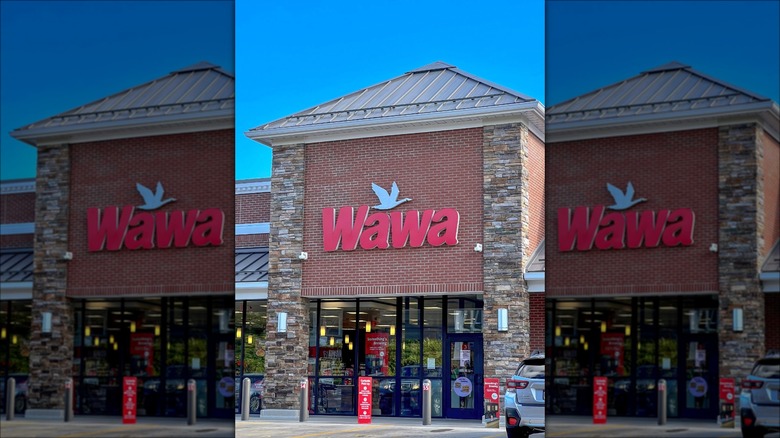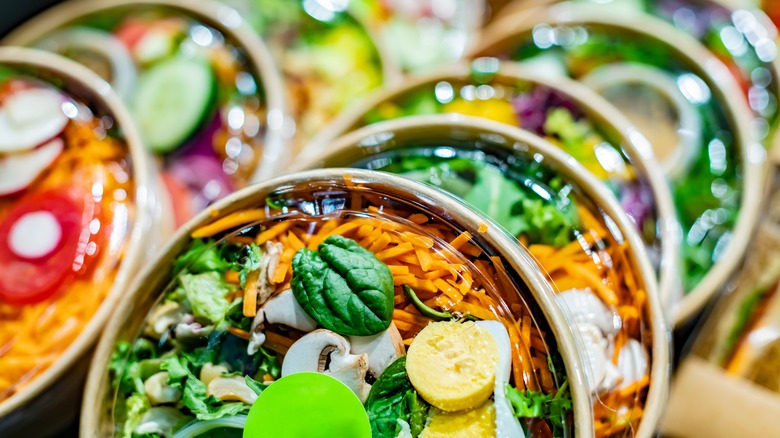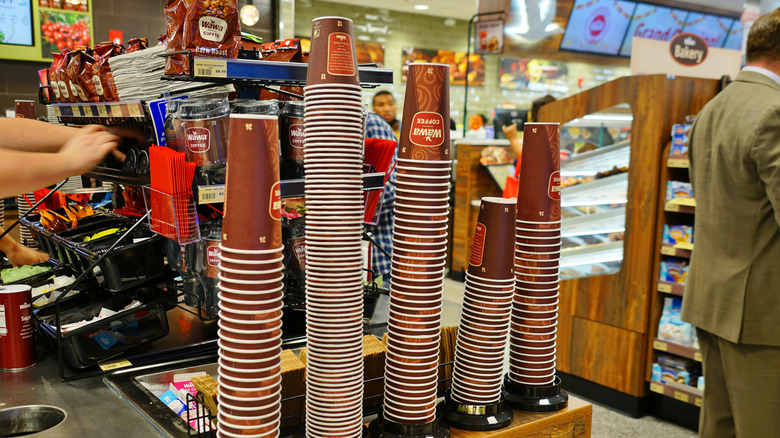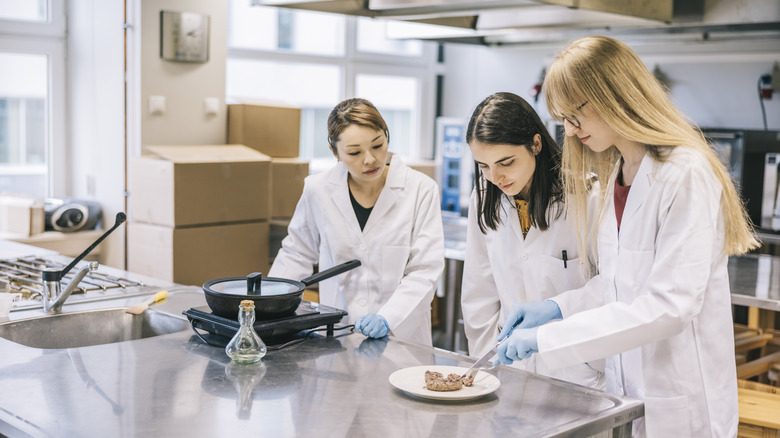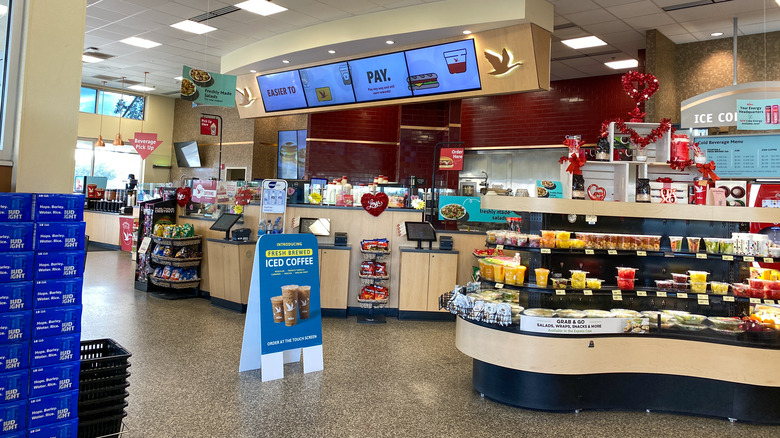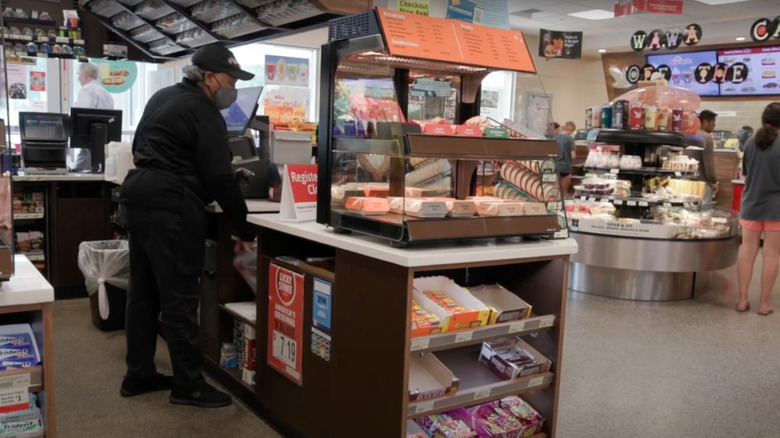Everything You Need To Know About Wawa, The Beloved Convenience Store
When you think of an entity with a cult-like following, movie or book franchises, like "Harry Potter" likely come to mind quicker than a convenience store chain — unless, of course, you're talking about Wawa. Then all bets are off. This regional specialty convenience store chain engenders that kind of froth-at-the-mouth excitement that people usually reserve for something, well, more pop culture-ish.
But Wawa, which has stores stretching from D.C. to Florida, is a different kind of convenience store. It serves food so good that you'll willingly forego your regular table at Olive Garden to nab a Wawa meatball hoagie with all the fixings instead. When the blues have grabbed you by the shirt collar, one trip to Wawa brings instant cheer as you enjoy niceties, like a stranger opening the door for you just because, along with a cup of its gourmet made-for-Wawa coffee and a fresh pastry from its pastry case. And at its most progressive stores, you'll see items like gas and cigarettes conspicuously absent, replaced by kale salads and Tesla filling stations.
With all these pleasantries, it's easy to get the feeling that if you're at Wawa, nothing very bad could happen to you there. While this probably isn't completely true, it's a vibe that the company's powers that be have tried very deliberately to create over the years. But this only barely scratches the surface of what the chain is all about. Here's the scoop on Wawa and why people love it so.
The name comes from Wawa, Pennsylvania
Wawa — so much confusion about the name, so little time. The conversation should start by pointing out that the convenience store chain was founded in Pennsylvania. Though a couple of towns in Pennsylvania get bandied about when people speak of the company's early history, Wawa, Pennsylvania, remains one of the most prominent. And Wawa, Pennsylvania, is still home to the company's corporate headquarters and was also the place where Wawa Dairy got its start.
But as it turns out, the word "wawa" is also based on two linguistic sources: Ojibwe — a Native American language — and French. The French word "oie," which sounds like "wa" means "goose." The Native American word – it's actually "wawa" – also means "goose." It's a linguistic anomaly that two very different languages have a root word that means the same thing in both languages. It's pretty universally agreed that in both cases, it's a Canadian goose that's being referred to. Convenient since the Canadian goose landed itself a spot on the company's logo.
It started as a textile company and iron foundry
How a company goes from a textile company in the 1800s to a gourmet food convenience store that doesn't even sell gas or cigarettes in at least one location is a long and winding road, to say the least. Wawa wasn't even Wawa originally, nor was it in the convenience store business, though, to be fair, convenience stores didn't take off until the 1920s when Southland Ice Company — 7-Eleven's precursor company — opened up what they called "Tote'm Stores.
As it turns out, the Wawa company predates convenience stores by about 100 years or so, getting its start at the turn of the 19th century as an iron foundry. By 1865, it made moves to incorporate as the Millville Manufacturing Company. Pre-Wawa Wawa dealt in textiles, boasting mills throughout the US. The name "Millville" came from the city in New Jersey where that part company was born. Wawa, in its pre-convenience-store days, operated as a textile company exclusively until 1890, at which time owner George Wood branched out into other businesses, some of which pointed, albeit subtly, to the convenience store food king that Wawa would eventually become.
There were several business ventures
Starting out, Wawa had more branches on its economic family tree than an apple orchard. Its business ventures constantly morphed, depending on the Wood family's interests and the opportunities that were available to them. After the company opened its textile mills, Millville Furnace, a company that produced iron fixtures like fire hydrants, opened. This laid the track — quite literally — for the Wood family to become railroaders, running the railroad from Philly to Pittsburgh.
Eventually, the family had its hands in a lot of apple pies, with ventures in children's hospitals, banks, dry goods, and even a collections company. In the last case, this venture crossed the Wood family's paths with none other than Abraham Lincoln himself, who, in his lawyer days, worked the collections aspect of their business as an independent contractor of sorts, for lack of a better way to say it. That was in 1838, right after he had begun working as an attorney. The eventual U.S. President followed up with some of the company's delinquent accounts to try to get them to pay up.
Wawa got into the milk business in the early 20th century
George Wood, the original founder of the textile company, followed up on his interest in dairy farming by opening the Wawa Dairy Farm in 1902. He had his uncle, David C. Wood, to thank for the money required to open the dairy, money which came from the iron foundries that built fire hydrants and railroad connections. The textile industry was changing, and a deficit of sorts in the dairy industry opened up an opportunity for the Wood family to make inroads into the dairy business. The deficit? Milk pasteurization, which was invented in the late 1800s, hadn't enjoyed widespread adoption yet, and as milk was a carrier of tuberculosis — something that pasteurization was meant to prevent — people were sometimes wary of drinking it.
Wood found a red-roofed dairy farm, the Rocky Run Dairy Farm, in Delaware County, Pennsylvania, and began making certifiably clean milk, taking care of one of the deficits that milk had. Wood's milk was "doctor certified" and went out to people's homes via home delivery for a time. This business became the Wawa Dairy farm, which eventually expanded into a 1500-acre outfit, thanks to some savvy investments in infrastructure, land, and livestock. The home delivery of milk continued well into the middle part of the 20th century, and Wood Dairy enjoyed an excellent reputation among its customers.
The first food market opened in the mid-1960s
During times of significant inflation, it might be difficult for people to imagine that someone would willingly pay $1.25 for something that could be thrown together at home for 10 cents, but the powers that be at Wawa in the mid-1960s banked on this tendency when the company opened its first convenience store in Folsom, Pennsylvania. For customers, having their milk delivered, as Wawa once did, didn't hold a candle to finding the gallon of milk they needed right next to a sandwich, the petrol tank, and the friendly smiles of the employees who checked them out.
And with store hours being 7:00 a.m. to 11:00 p.m., just like its competitor, 7-Eleven, Wawa made its way fully into the convenience store game. Eventually, that seven-to-eleven convenience gave way to around-the-clock convenience as the stores rolled into a new era. What didn't follow was a name change. The company remained Wawa, despite its expansion. The Wawa dairy business didn't end with the switch from delivery to convenience stores. The dairy aspect of Wawa is still going strong in the 21st century, with modern improvements to that aspect of the business coming on the regular.
It wasn't called Wawa until the mid-1970s
The Wawa company originally chartered as a business in 1865 as the Millville Manufacturing Co., and throughout its many expansions and its many decades of existence, the parent company retained its original name. It wasn't until 1974 that the company officially became Wawa, Inc., from headquarters down to its many convenience stores.
In many ways, the name change was the logical next step in a company's evolution, which originally had business dealings stretching from New Jersey to Pennsylvania. Its original name represented the manufacturing and distribution emphasis of the company, but the name "Wawa" encompassed much more of the company's philosophy. Millville Manufacturing Co. was kind of a catch-all name that reflected the industrial age in which came into being. The name "Wawa," on the other hand, takes a cue from the beloved Canadian geese that it gets its name from. Those birds fly together in V-formation, getting more energy from the wings of their fellow birds than they would by flying solo by as much as 71%. In the same way, the employees of the company work in tandem with one another, flying as a team, making the overall experience more efficient and enjoyable for all involved, and thus, required a name change to represent this philosophy.
It's a good place to have lunch
McDonald's. Subway. Taco Bell. Great places to have lunch, all of them, but these fast-food lunch giants may need to make way for the goose. Lunch at Wawa has a cool factor that goes beyond its food offerings. Case in point? A Saturday Night Live skit with Tina Fey featured the star jonesing over some hoagies that were meant to represent the pride of the City of Brotherly Love. They're not just any hoagie-roll sandwiches that Wawa sells. They're made-to-order and have been since 1984, the same year the company introduced their hot food offerings to the public. The soup's also fresh every day. Those who feel a bit peckish for a little something sweet find it in Wawa's fresh baked goods offerings. Those baked goods are awfully tasty with the cup of coffee that store guests can pick up while they're inside paying for gas or doing a bit of browsing while they stretch their legs during a long road trip.
Like many smaller chains such as Runza, with its popular midwestern sandwiches, the company enjoys cult brand status among those who stop by for lunch, per Get Pocket. Some of this is attributed to its excellent food offerings, but by all accounts, it's also a place that's known for its service, giving it a full-service restaurant-type vibe disguised behind a convenience store veneer.
Wawa signature brand coffee is only available at Wawa
Wawa Coffee counts among its fans at least one city mayor, Jim Kenney, mayor of Philadelphia. For fans like Kenney, there's only one place on the planet where they can secure their favorite steaming cup of happiness: Wawa. The company introduced its in-house coffee brand in the mid-1970s. By 2008, Wawa boasted one billion cups of coffee sold. In 2018, its Wawa Reserve coffee hit the market. This specialty line features specialty coffees in small batches. The company sells nearly 200 million cups of coffee per year and ranks in the top 10 among brewed coffee sellers in the U.S.
Coffee brewing at Wawa is the stuff that science is made of. It has almost a dozen people – engineer types – who study coffee service in detail. Someone also pays close attention to the stores' brew islands, and not one element is overlooked in the name of coffee-serving efficiency, including how far a customer has to reach to get coffee condiments in hand before sugar, cream, and other add-ons can get poured into the java in question. While this is important, the company stands behind the flavor of its coffees without add-ons – so much so that it recommends that customers try its specialty coffees black, something customers may want to try on Wawa's Free Coffee Tuesdays, a promotion that the convenience chain runs occasionally. No wonder it's considered among the best fast food coffees out there.
It has a 10,000 square-foot test kitchen
Long before Wawa serves recipes like a made-from-scratch soup, that recipe gets the once-over in Wawa's 10,000-square-foot test kitchen. In this foodie sacred space, food scientists, chefs, beverage concoctors, food safety specialists, and nutritionists put their stamp on recipe ideas that come from pretty much everywhere, including customers and store associates. Food trends also influence what foods get a chance to go from idea to full-blown meal. Given that Wawa has locations spanning New Jersey, Pennsylvania, Virginia, Maryland, and Delaware, that's a lot of inspired thoughts to sift through. The company's iconic meatball hoagie had to come from somewhere, after all.
Although Wawa counts as a popular option for lunch, the test kitchen has developed recipes for every meal of the day, from breakfast to dinner. There are also smoothie idea hatchers and even a coffee connoisseur who sips on the specialty coffee offerings in the same way that a wine sommelier would test wine or a craft beer brewer might to a specialty beer.
But probably the most promising offerings from the popular test kitchen are its programs that introduce future food scientists to the food business. Schools like P.S. DuPont Middle School in Wilmington, Delaware have had opportunities to visit the test kitchen and attend workshops that give students a behind-the-scenes glimpse at what goes into building recipes, ensuring food safety, and all other aspects of food planning for a big chain like Wawa.
There are over a thousand stores and more than 30K employees
With over 1,000 convenience store locations and 30,000 employees, Wawa has come a long way from its textiles and iron foundry roots. You don't go from there to here, in a manner of speaking, without being able to change and adapt to the times — a factor that is largely responsible for Wawa's continuing success.
Each change the company makes is deliberate and incremental, and one of the biggest changes for Wawa, of course, has to do with the sheer volume of stores and the people who work in them. Wawa builds its expansion strategy around the successes it has already won in the marketplace. That is to say that many of the chain's new stores go into areas that already have an abundance of Wawa locations. Customer service, no matter where you go, is also job No. 1 at Wawa, a job that's helped along by numerous touchscreen ordering options throughout store locations, allowing the "fast service" aspect of convenience stores to remain intact, even when employees get busy.
Finally, the company also remains consistent within new markets, offering cheap, yet nearly gourmet meal options in its stores, even ones that are located in spendier areas, like Washington, D.C., where Wawa customers can find dinner options, including drink and dessert, plus a snack for the road.
Employees play a pivotal role in the chain's success
Plenty of companies give lip service to their employees, speaking about them in glowing terms but falling short where it really matters, but Wawa bucks this trend. With employees owning 41% of the company, per Get Pocket, their contributions can't be underestimated, particularly given the fact that few members of the Wood family, the founding family of Wawa, work at the chain. Many of the company's employees who participate in company stock options and 401(k) plans have retired or will retire millionaires, some after only about 15 years of work at Wawa. It's very much an employee-forward company, with employees playing a huge part in the company's brand image. Truly, they have taken over the emotional ownership of the company that the Woods once had.
Of note is the chain's employee training program, which even got a nod from the Harvard Business Review. What also got the Ivy League publication's attention is the sheer volume of people who want to work for Wawa, like the more than 100,000 applications for less than 300 new jobs in the early part of the 2000s.
Wawa is involved in important charity work
In 2021, Wawa's charity, the Wawa Foundation, reached a significant milestone. It gave over $100 million to different charities, each of which centered around one of its pet causes: hunger, everyday heroes, and health, including breast cancer awareness. There have been 6,000 organizations (and counting) that have been beneficiaries of Wawa's charity giving. It's part of the chain's mission to give back to the communities that have bolstered the company throughout its decades of existence.
The Wawa Foundation identifies a 501(c)(3) nonprofit. Aside from infusing worthy organizations with money, the company also participates in fundraising activities through its Wawa Hoagie Fundraising Coupon Program, as well as through sponsorships, including those for businesses, community sports, education, and many more. It's made quite an impact and become part of the company's identity in a relatively short span, as Wawa's giving program began in just 2014.
